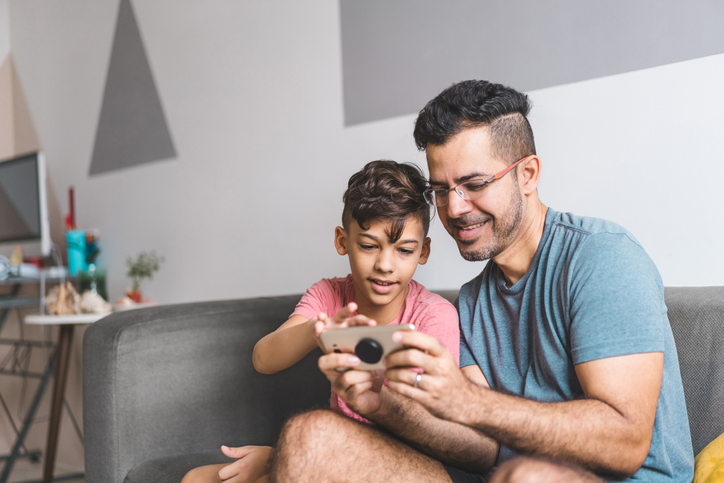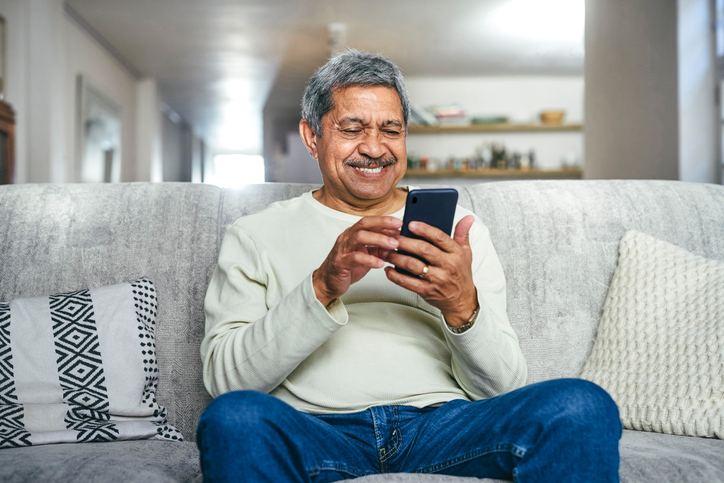5 Must Have Apps for Life Wireless Customers

In the United States, over 14% of the population lives under the poverty line, restricting them from acquiring the benefits of a smartphone. Fortunately, there is a federal benefit program called The Affordable Connectivity Program (ACP), and another called the Lifeline Program, that Life Wireless is associated with.
Life Wireless is an eligible telecommunications carrier for both these programs and can therefore offer free cell service to those who need such assistance to stay connected to doctors, employers, a beloved family member, etc., and who meet certain eligibility requirements.
For this piece we asked ourselves, what are 5 must have apps for Life Wireless customers? Here's what we came up with. We hope they're useful to you!

1. A Messaging App (e.g., WhatsApp, Facebook Messenger, or Signal):
A messaging app allows you to stay in touch with friends and family with just a few taps through text messages, voice calls, and video calls without using your cellular minutes. Following is additional information about WhatsApp, Facebook Messenger, and Signal:
WhatsApp:
Ownership:
WhatsApp is owned by Facebook, Inc., which also owns Facebook Messenger and Instagram.
Features:
Messaging:
WhatsApp allows users to send text messages, voice messages, images, videos, and documents to individuals or groups.
Voice and Video Calls:
It offers high-quality voice and video calling features, both one-on-one and in groups.
End-to-End Encryption:
WhatsApp is known for its strong end-to-end encryption, which means that only the sender and recipient can read the messages.
Status Updates:
Users can post status updates in the form of a text message, photos, or videos that disappear after 24 hours, similar to Stories on other social media platforms.
WhatsApp Web:
Allows users to access their WhatsApp account on a computer or tablet.
Privacy:
WhatsApp's privacy practices have been a topic of discussion. In early 2021, WhatsApp updated its privacy policy to share certain data with Facebook, which raised concerns among users about their data privacy. However, they later clarified that personal messages remain end-to-end encrypted and cannot be accessed by Facebook.

Facebook Messenger:
Ownership: Facebook Messenger is owned by Facebook, Inc.
Features:
Messaging:
Messenger allows users to send text messages, voice messages, images, videos, and documents.
Voice and Video Calls:
It offers voice and video calling features for one-on-one or group conversations.
Stickers and GIFs:
Messenger has an extensive library of stickers and GIFs to enhance conversations.
Integration with Facebook:
Users can connect Messenger with their Facebook account and access Messenger through the Facebook website or app.
Privacy:
Facebook Messenger offers various privacy settings to control who can contact you and see your information. Like WhatsApp, it also uses end-to-end encryption for secret conversations.

Signal:
Ownership: Signal is developed by the Signal Foundation, a non-profit organization.
Features:
End-to-End Encryption:
Signal is known for its strong commitment to privacy and security. All messages and calls are end-to-end encrypted by default. There are many apps that pay lip service to security and privacy, but Signal was built from the ground up with the goal of letting people easily communicate without having to worry about being overheard.
Disappearing Messages:
Users can set messages to disappear after a specified time period.
Voice and Video Calls:
Signal offers secure voice and video calling.
Screen Security:
Signal has a feature called "Screen Security" that prevents screen recording during a video chat and calls.
Open Source:
Signal is open-source software, which means its source code is available for public review, contributing to transparency and trust.
Privacy:
Signal is often praised for its privacy-centric approach. It collects minimal user data and is designed to offer strong privacy protections. The Signal app is a complete phone and SMS client replacement (though it works just fine as a standalone app, too) for sending and receiving encrypted calls and messages.
In summary, WhatsApp and Facebook Messenger are owned by Facebook and offer a wide range of messaging and communication features. While WhatsApp is known for end-to-end encryption, its privacy practices have raised some concerns. Signal, on the other hand, is one of the best apps for privacy with its strong emphasis on security and open-source development. Users often choose these apps based on their priorities regarding privacy, features, and ease of use.

2. An Email App (e.g., Gmail, Outlook, or Yahoo Mail):
An email app is essential for managing emails, especially if you need to access important communications or job-related messages. Here's an overview of Gmail, Outlook, and Yahoo Mail:
Gmail:
Provider: Gmail is provided by Google.
Features:
Generous Storage:
Gmail offers a generous amount of free storage space for emails and attachments.
Powerful Search:
Google's search technology is integrated into Gmail, making it easy to find specific emails and content within messages.
Labels and Filters:
Users can organize their emails using labels and set up filters to automatically categorize or forward emails.
Spam Protection:
Gmail has strong spam filtering to help keep unwanted emails out of your inbox.
Integration:
It seamlessly integrates with other Google services like Google Drive, Google Calendar, and Google Meet.
Mobile Apps:
Gmail provides mobile apps for both your Android device and iOS devices, ensuring easy access on the go.
Customization:
Users can customize their Gmail experience with themes and settings.
Privacy:
Google scans email content to display personalized ads, which can be a privacy concern for some users. However, they have implemented various security features, including two-factor authentication, to protect user accounts.

Outlook
Provider:
Outlook is a part of Microsoft's Office 365 suite and is offered by Microsoft.
Features:
Integration:
Outlook integrates seamlessly with Microsoft Office applications, making it a preferred choice for business users.
Calendar and Task Management:
It includes a robust calendar and task management system.
Focused Inbox:
Outlook uses machine learning to prioritize important emails in a "Focused" inbox while keeping less important emails in an "Other" inbox.
Aliases:
Users can create email aliases for added privacy and organization.
Mobile Apps:
Outlook offers mobile apps for both Android smartphone and iOS mobile devices.
Privacy:
Microsoft has strong security and privacy measures in place, and they don't scan email content for ad targeting. Outlook is often considered a secure choice for business and professional use.

Yahoo Mail
Provider:
Yahoo Mail is provided by Yahoo.
Features:
Themes:
Yahoo Mail offers a variety of themes to customize the look of your inbox.
Integration:
It integrates with Yahoo News, Yahoo Finance, and other Yahoo services.
Large Attachments:
Yahoo Mail allows users to send and receive large email attachments.
Spam Filters:
It includes spam filtering to reduce unwanted emails.
Mobile Apps:
Yahoo Mail provides mobile apps for both Android phone and iOS.
Privacy:
Yahoo Mail has faced privacy concerns in the past, but it has taken steps to improve security and user privacy. It doesn't scan email content for ad targeting.
When choosing an email service, consider your specific needs and preferences. Gmail is known for its powerful search and integration with Google services. Outlook is favored by many businesses for its integration with Microsoft Office. Yahoo Mail may be preferred for its customization options and large attachment support. Additionally, all three services offer free and paid versions with varying levels of storage and features, so you can choose the one that best suits your requirements.

3. A Weather App (e.g., The Weather Channel, AccuWeather, or Weather Underground):
A weather app helps users stay informed about local weather conditions, forecasts, and severe weather alerts. Here's an overview of The Weather Channel, AccuWeather, and Weather Underground:
The Weather Channel
Website and App:
The Weather Channel operates both a website (weather.com) and a mobile app.
Features:
Weather Forecasts:
Provides weather forecasts for locations worldwide, including current conditions, hourly forecasts, and extended forecasts.
Severe Weather Alerts:
Offers alerts for severe weather conditions like thunderstorms, hurricanes, tornadoes, and more.
Radar and Maps:
Includes interactive radar maps, satellite imagery, and weather maps to track weather patterns.
Video Content:
Provides weather-related news, videos, and expert analysis.
Personalized Weather:
Users can save multiple locations and customize their weather experience.
Accuracy:
The Weather Channel is known for providing reliable and up-to-date weather information and has a strong presence in the United States.

AccuWeather
Website and App:
AccuWeather offers both a website (accuweather.com) and a mobile app.
Features:
Local and International Forecasts:
Provides forecasts for locations worldwide, including hyper-local forecasts.
Weather Maps:
Offers various maps, including radar, satellite, and temperature maps, for tracking weather conditions.
Severe Weather Alerts:
Sends alerts for severe weather events, including thunderstorms, hurricanes, and winter storms.
MinuteCast:
Provides minute-by-minute precipitation forecasts for the next two hours.
Lifestyle Forecasts:
Offers weather forecasts tailored to specific outdoor activities or health concerns.
Accuracy:
AccuWeather is known for its accurate and detailed weather forecasts, making it a popular choice for users who need precise weather information.

Weather Underground
Website and App:
Weather Underground operates a website (wunderground.com) and a mobile app.
Features:
Personal Weather Stations:
Weather Underground integrates data from personal weather stations, providing hyper-local weather information from users' neighborhoods.
Radar and Satellite Maps:
Offers interactive radar and satellite maps for tracking weather patterns.
Weather History:
Allows users to access historical weather data for specific locations.
Customizable Widgets:
Users can create and customize weather widgets for their devices.
Community and User-Generated Content:
Weather Underground has an active online community where users can share weather observations and reports.
Accuracy:
Weather Underground is known for its community-driven approach, which can provide highly localized and accurate weather data, especially in areas with active user participation.
When choosing a weather app or website, it's essential to consider your specific needs. All three of these services provide valuable weather information, but they may have different strengths and features that cater to different user preferences. Additionally, their accuracy may vary depending on your location and the quality of available data sources.

4. A Navigation and Maps App (e.g., Google Maps or Waze):
These apps provide directions, traffic updates, and information about nearby businesses, which can be helpful for getting around and finding essential services. Here's an overview of Google Maps and Waze:
Google Maps:
Provider:
Google Maps is developed and maintained by Google.
Features:
Maps and Directions:
Google Maps provides detailed maps and offers turn-by-turn directions for driving, walking, cycling, and public transportation.
Traffic Information:
It offers real-time traffic updates, estimated travel times, and alternative routes to help users avoid congestion.
Street View:
Google Maps has a "Street View" feature that allows users to virtually explore streets and neighborhoods with 360-degree panoramic imagery.
Location Sharing:
Users can share their real-time location with friends and family and see their contacts' locations as well.
Integration with Google Services:
It seamlessly integrates with other Google services, such as Google Search, Google Photos, and Google Calendar.
Offline Maps:
Google Maps allows users to download maps for offline use, which can be a handy tool when traveling without a data connection.
Accessibility:
Google Maps offers features for accessibility, such as voice-guided navigation and information about accessible transit routes and facilities.
Integration with Other Apps:
Developers can integrate Google Maps into their own applications and services using Google Maps Platform APIs.

Waze:
Provider:
Waze was developed by an Israeli company and was later acquired by Google.
Features:
Crowdsourced Data:
Waze relies heavily on crowdsourced data from its users. Drivers can report traffic jams, accidents, road closures, and police presence, which is then shared with other Waze users in real-time.
Community-Driven:
Waze has a strong sense of community, with users actively contributing to the accuracy of the app's data.
Voice-Guided Navigation:
Waze provides voice-guided navigation with turn-by-turn directions.
Real-Time Information:
Users receive real-time information about road conditions and potential hazards.
Points System:
Waze has a points system that rewards users for reporting and contributing to the community.
Integration with Spotify and Other Apps:
It offers integrations with third-party apps like Spotify for music and streaming music too.
Social Features:
Waze encourages social interaction among users by allowing them to see friends on the map and coordinate arrivals with them.
Traffic-Based Routing:
Waze specializes in routing users based on real-time traffic conditions, often suggesting alternative, faster routes based on user reports.

Both Google Maps and Waze have their strengths. Google Maps is known for its comprehensive mapping data and integration with other Google services. It's a versatile choice for various navigation needs. On the other hand, Waze is known for its community-driven approach and real-time traffic updates, making it particularly useful for commuters who want to avoid traffic jams and find the fastest routes.
Users often choose between these two apps based on their specific needs, such as whether they prefer a more traditional navigation experience (Google Maps) or a community-driven, real-time traffic-focused experience (Waze).
5. A Health and Fitness App (e.g., MyFitnessPal, Fitbit, or Google Fit):
A health and fitness app can help users track their physical activity, monitor their health goals, and stay active. Here's an overview of MyFitnessPal, Fitbit, and Google Fit:
MyFitnessPal:
Platform:
MyFitnessPal is available as both a a mobile phone app and a website (myfitnesspal.com).
Features:
Calorie Tracking:
MyFitnessPal allows users to track their daily calorie intake by logging their meals and snacks.
Food Database:
It has an extensive food database with a wide range of foods, including branded items, making it easy to find and log what you eat.
Exercise Tracking:
Users can log their physical activities and workouts to monitor calorie expenditure.
Goals and Progress:
It helps users set fitness and weight loss goals and track their progress over time.
Community and Social Features:
MyFitnessPal has a social aspect that allows users to connect with friends and family member., join groups, and provide and receive support.
Integration with Fitness Devices:
It can sync data with your phone, various fitness trackers and smart scales for more accurate tracking.
Premium Version:
MyFitnessPal offers a premium subscription program that provides such other services as advanced nutrition tracking, customized goals, and an ad-free experience.

Fitbit
Platform:
Fitbit offers a mobile app (Fitbit app) and a range of wearable fitness trackers and smartwatches.
Features:
Activity Tracking:
Fitbit devices track various activities, including steps taken, distance traveled, calories burned, and floors climbed.
Heart Rate Monitoring:
Many Fitbit devices include heart rate monitoring, which helps users gauge their fitness and stress levels.
Sleep Tracking:
Fitbit offers detailed sleep tracking, including insights into sleep stages and duration.
Mobile App:
The Fitbit app provides a comprehensive dashboard for users to view their activity, sleep, and health data.
Community and Challenges:
Users can connect with friends, play games, join challenges, and compete with others for added motivation.
Smart Notifications:
Fitbit devices often feature smartphone notifications for calls, texts, and app alerts.
Premium Version:
Fitbit Premium offers advanced features like guided workouts, health insights, and personalized coaching.

Google Fit
Platform:
Google Fit is available as a mobile app for both Android and iOS devices.
Features:
Activity Tracking:
Google Fit automatically tracks physical activity, including steps, cycling, and other exercises.
Heart Points and Move Minutes:
It uses "Heart Points" and "Move Minutes" to encourage users to engage in physical activity and improve heart health.
Integration with Other Apps:
Google Fit can sync data from various fitness and health apps and devices.
Strength Training and Yoga Tracking:
It allows users to manually log strength training and yoga sessions.
Health Metrics:
Google Fit can track and display health metrics like weight, blood pressure, and blood glucose levels if users input this information manually.
Wearable Compatibility:
Google Fit works with a range of Android Wear OS smartwatches and fitness trackers, as well as other fitness apps and devices.
The choice between these platforms depends on individual preferences and needs. MyFitnessPal is primarily focused on nutrition tracking and offers a vast food database. Fitbit is known for its hardware devices and comprehensive fitness tracking capabilities. Google Fit is a versatile, mobile-centric platform that integrates with various Android apps and services, making it a good choice for Android users who want a holistic view of their health and activity data.

Remember that the choice of apps ultimately depends on individual interests and needs. Life Wireless customers may also want to consider apps for entertainment, social media, and productivity based on their preferences and daily activities. To research those, visit Apple's App Store or the Google play store where you can get detailed information and download your selections to your mobile phone.
At Life Wireless, we believe in helping you get the free cellular service you deserve for FREE.
Join our happy customers in getting a free smartphone and monthly wireless service.
What our customers are saying:
"Life Wireless has been great. I have used it so many times for appointments and finding the proper care providers for my needs as well as for my family's needs. Thank you so much Life Wireless!" Rebecca L., KY
“Without this this phone service I would be lost. It has helped me stay in contact with my daughter’s specialist. I schedule her appointments and they can call back if there are any complications with her results. Thank you, Life Wireless.” Amanda Z., PA
“I've been looking for apartments, doctor’s offices, and school phone numbers, and my data provided has been a tremendous help in gaining access to this information. I'm very grateful for this service.” Maria R. AZ
Apply for free cellular service with Life Wireless now. You’ll be glad you did.
Have questions? Call customer service at 1-888-543-3620. (OR dial 611 from your Life Wireless phone.)
Posted 9 months ago